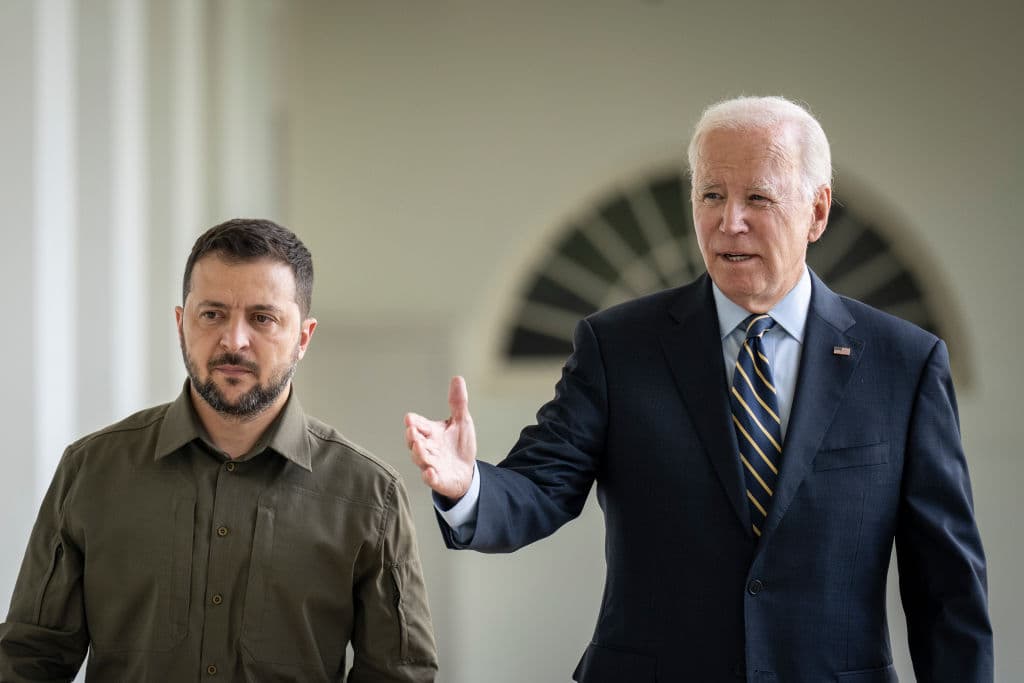Progress on Russia, Ukraine Talks To Limit Strikes on Energy Plants Underscores Another Biden-Harris Failure
The war in Ukraine has been dragging on for so long that, absent effective American leadership, the belligerents are apparently starting to sort out some thorny problems for themselves.

If the Biden-Harris administration spent half as much time crafting a coherent foreign policy as it did demonizing the Trump administration, the world might be in a slightly less combustible state. The war in Ukraine has been dragging on for so long that, absent effective American leadership, the belligerents are apparently starting to sort out some thorny problems for themselves.
Ukraine and Russia, according to a Financial Times report, have quietly been engaged in informal talks to pause attacks on each other’s energy infrastructure. Talks reportedly started in August but were said to be stalled by the Ukrainian incursion into Russia’s Kursk region.
On Wednesday the Kremlin spokesman, Dmitry Peskov, denied any dialogue was taking place. “There’s a lot of fake news nowadays, and it has nothing to do with reality,” he told reporters when asked about the report, adding “Even the most reputable publications don’t shy away from this.”
Still, the newspaper reports that an unnamed Ukrainian official told it that Russian and Ukrainian intelligence agencies reached an understanding to reduce the frequency of attacks on each other’s energy plants in recent weeks.
Qatar is reportedly acting as a middleman. This news comes as the efforts of President Biden’s top diplomat, Antony Blinken, to calm the waters in beleaguered Ukraine and the Middle East have been almost universally panned as middling at best. Over the past three and a half years, Mr. Blinken has reliably issued statements about the fiendishness of the Russians, which is not exactly groundbreaking news, without doing much else about it.
The unnamed official also told the FT that Kyiv will continue to strike targets in Russia, including oil refineries. For Ukraine though, the potential agreement on other energy facilities is especially important ahead of the upcoming winter. President Zelensky has said that Russia has already destroyed half of Ukraine’s energy capacity, and it is going to be cold outside.
Turkey too has been a backstage actor in some of these nascent mediation efforts. The head of Russia’s security council, Sergei Shoigu, said in early September that his boss, President Putin, would be amenable to ceasing attacks on Ukrainian energy plants, at the suggestion of President Erdogan. Again, the situation in Kursk nipped that in the bud.
The question of where the projection of American power is in all of this is hard to ignore, particularly one week before a presidential election. Some would argue that the Biden administration, in its attempts to isolate Moscow through sanctions and by other means, has not only boxed itself in but just as problematically, farmed out diplomacy to third-party countries that at the end of the day just don’t have the chops to seal lasting deals.
Little wonder then that out of sheer exhaustion if nothing else the warring parties may end up discussing things among themselves. Of course, when it comes to rocket and drone strikes on buildings and factories this is all within the framework of conventional warfare, and the weighty issue of nuclear weapons is something else.
In terms of the next six months or so, however, with the onset of winter plus a new occupant in the Oval Office, it is the misery of a conventional war and how to handle it that will demand attention.
It is not exactly looking up for Ukraine right now. After nearly a thousand days of fighting Ukraine still faces enormous challenges. Russian troops are advancing in eastern Ukraine and according to multiple European press reports have grabbed nearly 200 square miles of territory in the past month alone. If true, those would be Russia’s biggest territorial gains since March 2022, a month after the full-scale invasion.
In an interview with a former Ukrainian lawmaker on Monday, a Ukrainian major general, Dmytro Marchenko, said that “We all know that I am not revealing any military secrets when I say that our front in the east has collapsed.”
When pressed to comment on the reasons for the Russian advance, General Marchenko said, “Firstly, there is a lack of ammunition and weapons, and secondly there is a lack of people, there are no men, no replacements, the soldiers are tired, they cannot cover the front line where they are.”
The battle-hardened Ukrainians soldiers are tough. Yet given this state of affairs, and that nobody talks about the wholesale destruction of Ukrainian cities like Mariupol anymore, is it any wonder that Mr. Putin was fairly beaming during the Brics summit at Kazan earlier this month?

